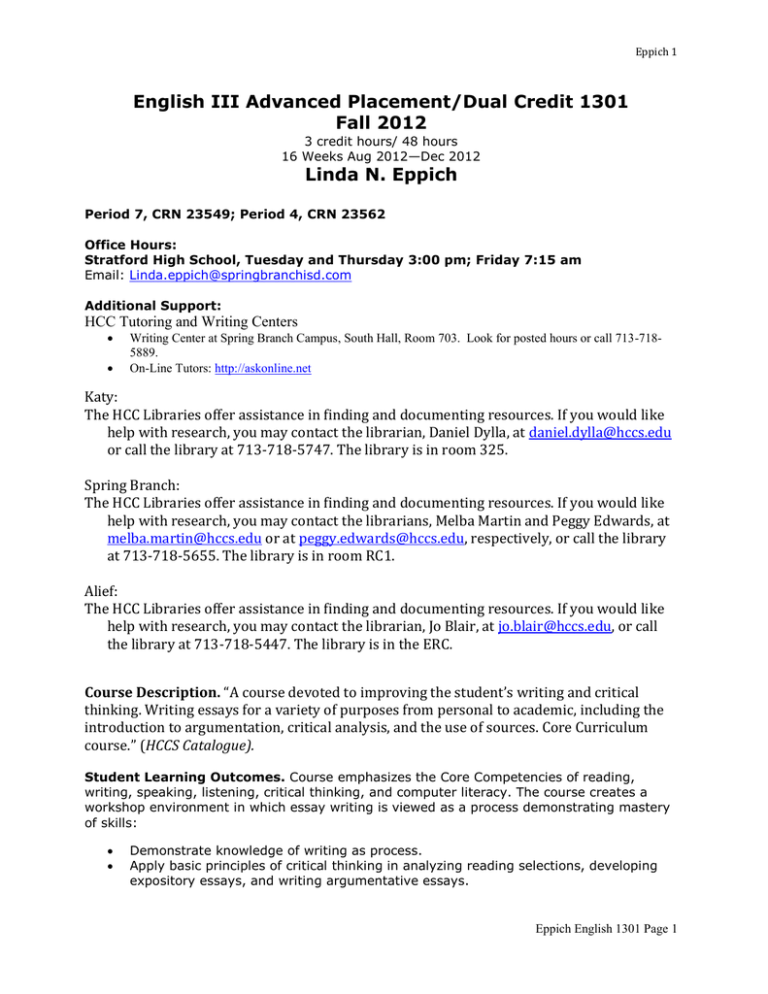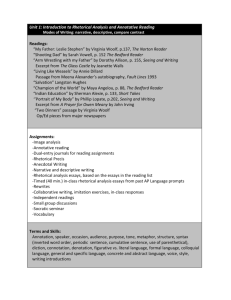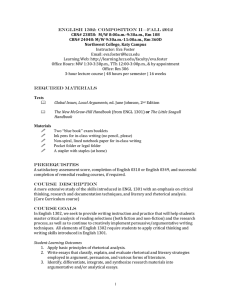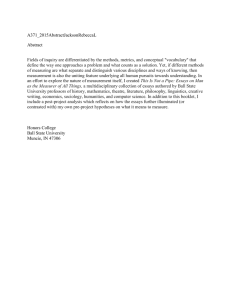
Eppich 1
English III Advanced Placement/Dual Credit 1301
Fall 2012
3 credit hours/ 48 hours
16 Weeks Aug 2012—Dec 2012
Linda N. Eppich
Period 7, CRN 23549; Period 4, CRN 23562
Office Hours:
Stratford High School, Tuesday and Thursday 3:00 pm; Friday 7:15 am
Email: Linda.eppich@springbranchisd.com
Additional Support:
HCC Tutoring and Writing Centers
Writing Center at Spring Branch Campus, South Hall, Room 703. Look for posted hours or call 713-7185889.
On-Line Tutors: http://askonline.net
Katy:
The HCC Libraries offer assistance in finding and documenting resources. If you would like
help with research, you may contact the librarian, Daniel Dylla, at daniel.dylla@hccs.edu
or call the library at 713-718-5747. The library is in room 325.
Spring Branch:
The HCC Libraries offer assistance in finding and documenting resources. If you would like
help with research, you may contact the librarians, Melba Martin and Peggy Edwards, at
melba.martin@hccs.edu or at peggy.edwards@hccs.edu, respectively, or call the library
at 713-718-5655. The library is in room RC1.
Alief:
The HCC Libraries offer assistance in finding and documenting resources. If you would like
help with research, you may contact the librarian, Jo Blair, at jo.blair@hccs.edu, or call
the library at 713-718-5447. The library is in the ERC.
Course Description. “A course devoted to improving the student’s writing and critical
thinking. Writing essays for a variety of purposes from personal to academic, including the
introduction to argumentation, critical analysis, and the use of sources. Core Curriculum
course.” (HCCS Catalogue).
Student Learning Outcomes. Course emphasizes the Core Competencies of reading,
writing, speaking, listening, critical thinking, and computer literacy. The course creates a
workshop environment in which essay writing is viewed as a process demonstrating mastery
of skills:
Demonstrate knowledge of writing as process.
Apply basic principles of critical thinking in analyzing reading selections, developing
expository essays, and writing argumentative essays.
Eppich English 1301 Page 1
Eppich 2
Analyze elements such as purpose, audience, tone, style, strategy in essays and/or
literature by professional writers.
Synthesize concepts from and use references to assigned readings in their own
academic writing.
Write essays in appropriate academic writing style using varied rhetorical strategies.
Clear thesis statements
Relevant, engaging evidence, comprising developed reasoning using
modes of discourse with elaboration of detail and example
Focused and purposeful organization based on a unifying principle
Appropriate strategies to purposefully engage a targeted audience
Purposefully constructed and varied syntax
Skillful choice of diction and style
Persuasive grammar
Appropriate tone
Correct use of manuscript form (MLA)
Learning Objectives. Course emphasizes the Core Competencies of reading, writing,
speaking, listening, critical thinking, and computer literacy. The course creates a workshop
environment in which essay writing is viewed as a process demonstrating mastery of skills:
Demonstrate writing as a connected and interactive process which includes planning,
shaping, drafting, revising, editing, and proofreading.
Demonstrate critical abilities when discussing texts in class and in writing
assignments by delving into the meanings and implications behind the issues, theses,
or themes.
Analyze texts by professional writers and write critical essays breaking down
rhetorical elements into parts, examining the parts, and showing their effect.
Apply various methods of development and organization, and / or rhetorical appeals
in written assignments.
Demonstrate effective use and documentation of sources in support of student ideas
in informative and/or persuasive essays.
Educational Outcome. Students will compose a minimum of 6000 words during the
semester as they
Understand writing as a connected, interactive process that includes planning,
shaping, drafting, revising, and editing.
Apply the writing process as appropriate to in-class, impromptu writing
Apply the writing process to revise impromptu writing for a wide variety of purposes
Apply peer and teacher comments from evaluated essays to other writing projects
Use principles of critical thinking in analyzing reading selections and in developing
expository and argumentative essays
Use assigned readings as mentor texts in developing essays
Analyze rhetorical elements, such as purpose, audiences, tone, strategies, in both
professional writing and student exemplars
Use a variety of modes of discourse and writing strategies to develop writings
Use thoughtful, careful reasoning and logic in all writing assignments
See English 1301 Study Guide.
Prerequisites. A satisfactory TAKS or COMPASS score.
Reasonable Accommodations. Any student with a documented disability who needs to
arrange reasonable accommodations must contact the Disability Services Office for
Northwest College at the beginning of the semester at the ADA Counseling office in RC 12 at
Eppich English 1301 Page 2
Eppich 3
the Town and Country campus: 713.718.5422. Faculty members are authorized to provide
only the accommodations requested by the Disability Support Service Office.
Academic Honesty. All work you submit must be your own. Services of Turnitin.com will be
employed. If you consult any sources, whether oral or written, you must clearly distinguish
between your words/ideas those of a source at all times:
Students are responsible for conducting themselves with honor and integrity
in fulfilling course requirements. Penalties and/or disciplinary proceedings
may be initiated by College System officials against a student accused of
scholastic dishonesty. Scholastic dishonesty includes, but is not limited to,
cheating on a test, plagiarism, and collusion.” (HCCS Student Handbook)
Cheating includes, but is not limited to,
Copying from another student’s paper
Using materials not authorized by the person giving the test
Collaborating with another student during a test without authority
Knowingly using, buying, selling, stealing, transporting, or soliciting in whole
or in part the contents of an un-administered test
Bribing another person to obtain a test that is to be administered
“Plagiarism means the appropriation of another’s words or ideas and the unacknowledged
incorporation of that work in one’s own written work offered for credit.” (HCCS Student
Handbook)
“Collusion means the unauthorized collaboration with another person in preparing written
work offered for credit.” (HCCS Student Handbook)
Work which shows any evidence of plagiarism and/or collusion will receive a grade of zero. A
grade of “F” may be given for the entire course.
Attendance and Withdrawal Policies. Students with more than 6 hours of absences or 3
classes may be dropped for excessive absence. Only the instructor has the ability to drop a
student from a course. In 2007, the Texas Legislature passed a law limiting students to no
more than six total course withdrawals throughout their academic career in obtaining a
baccalaureate degree. There may be future penalties imposed. The last date to withdraw
from this course is 6 November 2011.
Course Requirements for HCCS Grade. In-class midterms and final exam essays must
average above 70% to receive a grade of A-D, i.e., credit for the course. A minimum of 5000
words is required.
Readings: This is a discussion-based course. Reading quizzes/journal
entries/professionalism/presentations (enthusiastic participation in all facets of
classroom life). Portfolio Assessment/Participation: 20% (reading quizzes count
more heavily for SHS grades!)
Essays: 50%
McGraw-Hill Personalized Learning Plan: 10%
Final Essays: 20%
In-class midterms and final-exam essays must average above 70% to receive a
grade of A-D, i.e., credit for the course. A minimum of 5000 words is required.
Eppich English 1301 Page 3
Eppich 4
Course Requirements for Stratford Grade. Many SHS grades do not become a part
of the HCCS grade.
Weight 1: daily/quizzes/homework/journals/in-class exercises/group
work/presentations
Weight 2: major quizzes/homework
Weight 3-5: Major tests and essays
A (90-100) Exceptionally fine work, with superior mechanics, style, and content.
B (80-89) Very good work. More than meets requirements.
C (70-79) Good work that achieves its purpose. Fully meets all requirements.
D (60-69) Below-average work. Noticeably weak.
F (0-68) Failing work that is clearly deficient.
Late Work/Make-Up Work. This is a process class—not a “turn-it-in-for-a-grade
class.” The instructional process fails when you fail to read assigned texts or to
submit homework in an orderly manner. Homework and journal entries cannot be
submitted late (Weights 1 or 2). Major essays (Weight of 3 for SHS only) will be accepted
late for a 10% penalty per calendar day. Quizzes and tests should be made up within 7
calendar days of the original test date; at the teacher’s discretion a make-up test or quiz can
be required during the first day back of the student’s return; seven days is the maximum
number of days to make-up in-class essays or quizzes. If you are absent, your homework is
due the morning of the next calendar day—not the next day you have class on alternating
block. If you are absent, you must pick up missed handouts the next calendar day—not the
next class day on alternating block.
EGLS3 -- Evaluation for Greater Learning Student Survey System at Houston Community
College. Professors believe that thoughtful student feedback is necessary to improve
teaching and learning. During a designated time, you will be asked to answer a short online
survey of research-based questions related to instruction. The anonymous results of the
survey will be made available to your professors and division chairs for continual
improvement of instruction.
TEXTBOOKS AND STUDENT RESOURCES
Summer Reading Choice of one (student purchase)
Bel Canto
Slaughterhouse-Five
The Things They Carried
Analysis Worksheets and Primary Documents: Artifacts, Cartoons, Documents, Maps, Motion
Pictures, Paintings, Photographs, Posters, Sound Recordings. U.S. National Archives
& Records Administration www.archives.gov.
Daniel, Kathleen, et al. Elements of Literature. Fifth Course. Austin: Holt, 2000. [EOL]
Hawthorne, Nathaniel. The Custom House. Close reading of argument through image;
analysis of relationship of author to text. The Scarlet Letter. Close reading of logos,
pathos, and ethos arguments in initial and final “court” scenes on the scaffold;
analysis of argument by analogy and image. (student purchase)
Eppich English 1301 Page 4
Eppich 5
McCuen, Jo Ray, and Anthony C. Winkler. Readings for Writers. 9th ed. New York:
Harcourt, 2006. [RW]
McGraw-Hill Personalized Learning Plan for Grammar (student purchase)
HCC students are required to register for their section’s McGraw Hill Grammar Book and Program ($30
online payment required; http://connect.mcgraw-hill.com/class/l_eppich_23549; http://connect.mcgrawhill.com/class/l_eppich_23562.
SUPPLEMENTAL RESOURCES
Barnet, Sylvan, William Burto, and William E. Cain, eds. Literature for Composition. 8th ed.
Upper Saddle River: Pearson Longman, 2003.
CNN: Current Event Awareness. Video database.
http://www.pbs.org/now/thisweek/archive.html.
Cohen, Samuel J., ed. 50 Essays: A Portable Anthology. New York: Bedford, 2004.
Excerpts from nonfiction from College Board Released AP Practice Tests and Prompts.
Kirszner, Laurie G., Stephen R. Mandell, and Patrick Clauss. Patterns in College Writing. 10th
ed. Boston: Bedford/St. Martin’s, 2006.
McQuade, Donald, and Robert Atwan, eds. The Writer’s Presence: A Pool of Readings. 5th ed.
Boston: Bedford/St. Martin’s, 2006.
Shea, Renee H., Lawrence Scanlon, and Robin Dissin Aufses. i-Claim. DVD. The Language of
Composition: Reading, Writing, Rhetoric. Boston: Bedford/St. Martin’s, 2008.
REQUIRED SUPPLIES
Summer reading novels required everyday; The Scarlet Letter; The Adventures of
Huckleberry Finn; a hardcopy of Martin Luther King’s “A Letter from Birmingham Jail”
McGraw-Hill’s Personalized Learning Plan—online grammar handbook
Loose-leaf binder dedicated to English with dividers, wide-lined loose-leaf paper, and
three-holed blank computer paper
Blue-ink pen; pencils; highlighters; post-it notes
Writing Portfolio
Two narrow-ruled Composition Books
PROJECTED CALENDAR
Visions, Voyages, and Violence (Weeks 1-3) Understand the elements of the
rhetorical situation of arguments, appeals, assumptions, rhetorical triangle; use
SOAPStone as a strategy to analyze elements; apply the modes of discourse in journal
writing; establish a Personalized Learning Plan for grammar; apply organizational
patterns that support purpose; improve precision of word choice; use MLA formatting;
revising (peer evaluation) and editing; using turnitin.com as a “grammar checker.”
7 Sep—McGraw-Hill Online Diagnostic Test
Summer reading novels—Bel Canto, Slaughterhouse-Five, or The Things They Carried.
How to Write a Definition RW 459-61
Editing for Word Choice
Eppich English 1301 Page 5
Eppich 6
George Orwell. “Politics and the English Language.” LC .529.
Randall Jared. “The Death of the Ball Turret Gunner.” EOL 933.
Anne Bradstreet. “Upon the Burning of Our House.” EOL 69.
Flannery O’Connor. “A Good Man Is Hard to Find.” RW 158.
James Joyce. “Hell.” RW 364.
Sir Francis Bacon. “Of Revenge.” HO.
William Bradford. “Of Plymouth Plantation.” EOL 27.
Mary Rowlandson. Excerpt, “A Narrative of the Captivity.” EOL 39
Essay 1: Definition
Constructing the American Dream (Weeks 4-5) Understand purpose in research
assignments (informative, interpretive, persuasive); use databases to search for online
and print sources; distinguish between primary and secondary sources; integrating
quotes; in-text citation; synthesize sources; use MLA-formatting to create a Works Cited
page; avoid plagiarism
How to Write Cause and Effect RW 570-72.
Benjamin Franklin. Excerpt, Autobiography. EOL 85.
Online Group Technology Project: Create a webpage that synthesizes four
sources to challenge a Franklin aphorism—include counterargument
Essay 2: Synthesis Argument/Counterargument using Cause and Effect
And Keeping It Alive (Weeks 6-8) Understand dominant impression as pathos
appeal; identifying fallacies in logos appeals; evaluating ethos appeals; using analogies,
similes, and metaphors as comparative devices.
How to Write Description (images, word choice, dominant impression) RW 343—46.
How Write Comparison/Contrast RW 519-20.
Bill McKribbin. “Waste Not Want Not.
Yevginiya Iomaking. “’Going Green’ Misses the Point.”
N. Scott Momaday. “The Way to Rainy Mountain” EOL 1092.
Video clips from Stagecoach, the Lone Ranger, and Smoke Signals
Excerpt-Patrick Henry “Speech to the Virginia Convention.” EOL 101.
Excerpt-Thomas Paine’s “The Crisis, No. 1.” EOL 107.
Bruce Catton. “Grant and Lee: A Study in Contrasts.” RW 535-38
Video—Trusting Political Ads
Video Excerpts-Speeches: President Obama, George Bush’s 9-11, Ronald Regan’s “Tear
Down This Wall,” and FDR’s “Four Freedoms.”
Midterm Essay 3 (week 7): Comparison/Contrast Analysis: A Sense of Place
Douglass, Frederick. Excerpt, The Narrative of the Life of Frederick Douglass. EOL 425.
Redefining the Dream—Arguments by Genre (Weeks 9-14)
Nov 19: Post-Test on Personalized Learning Plan
Henry David Thoreau. Excerpts, Walden. EOL 232; RW 586.
Rachel Carson. Excerpt, Silent Spring. LC 802.
Nathaniel Hawthorne. The Scarlet Letter.
Martin Luther King. Letter from Birmingham Jail. LC 260.
Journals #4: Rhetorical Analyses of Three Passages from Autobiography,
Fiction, and Argument
Essay 5: Rhetorical Analysis of Thoreau passage
Final Exam 6: Argument using four modes of discourse.
Eppich English 1301 Page 6
Eppich 7
COURSE PLANNER AND TEACHING STRATEGIES
CALENDAR POSTED SEPARATELY AND ALSO ON
STRATFORD WEB PAGE
HTTP://SSH.SPRINGBRANCHISD.COM/FACULTY/TEACHE
RS/LANGUAGEARTS/LINDAEPPICH/TABID/17541/DEFAU
LT.ASPX
Eppich English 1301 Page 7







